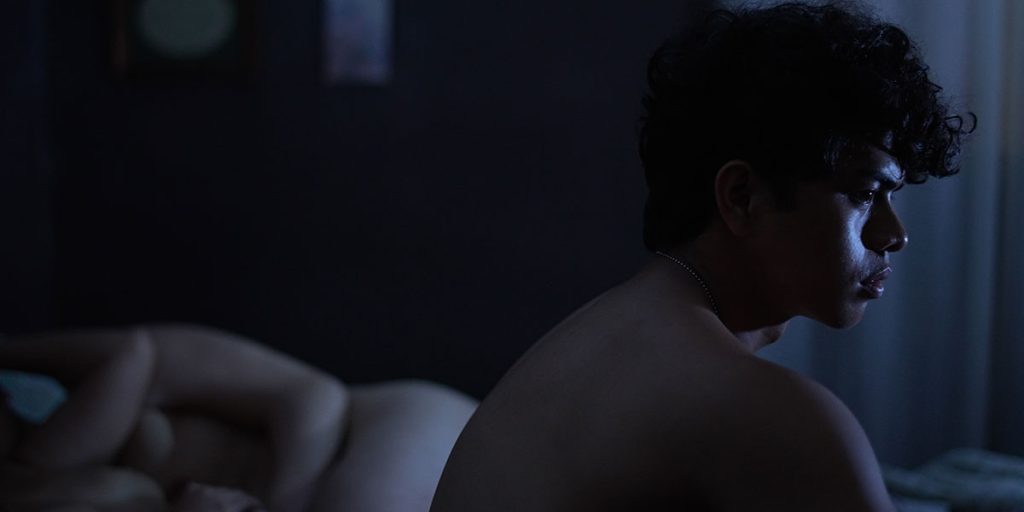
Full spoilers ahead.
Hidden in TIFF’s selections year after year are films that can ill afford the priceless combo of soft power, celebrity and public relations necessary to capture an audience. Coupled with unfavourable screening times, these films inevitably receive the least attention in the festival’s annual lineups. This year, one such example was Jun Robles Lana’s subversive erotic drama Your Mother’s Son—but whose Tagalog title, Anak Ka Ng Ina Mo is more accurately translated as You Are Your Mother’s Child. Unlike two other audience-friendly feature films that Lana directed this year, the planned domestic release for this more serious drama has yet to be secured due to obvious concerns with censorship. Nevertheless, this nugget of a film is a striking example of trenchant storytelling brought to life by economical filmmaking, narrative brevity and a small ensemble of notable performances. Conceived and co-written by Lana and Elmer Gatchalian during the height of the pandemic, their story was inspired by the chilling societal effects of former Filipino president Rodrigo Duterte’s anti-narcotics campaign that was popular nationwide during his tenure, where his personal support for widespread and indiscriminate vigilantism had fatally ensnared scores of lives.
In an undisclosed countryside village, a pair of itinerants presents themselves to the community as an attractive middle-aged mother, Sarah (Sue Prado) and her young adult son, Emman (Kokoy de Santos). The curious locals know nothing of their history, but it is cheekily divulged to us early on that the two are secretly living as a married couple: Sarah was a high school teacher and Emman was her student. Beyond their scandalous May-December relationship, it is also revealed why their convenient parent-child front is necessary: Emman is a meth addict and womanizer, and Sarah preys on these vulnerabilities to keep him captive. The extent of Sarah’s debauchery is soon laid bare when she invites another of her students, Oliver (Miggy Jimenez) to live in her harem under the guise of being a maternal proxy to him. Like Emman, Oliver is an emotionally crippled druggie burdened with Oedipal issues. Before long, an increasingly jealous Emman correctly senses that Sarah is betraying him and decides on a plan to kill them both. Beyond this plot, it is also implied that these characters are always on the run from the strains of moral surveillance in society, and that not even the greener pastures of the hinterlands are a refuge for their self-perpetuating troubles.
In a September 2023 interview with Deadline, Lana said that although the film’s inspiration came from the brutality of the anti-narcotics campaign, there was a wider allegorical fascination that he wished to explore about the Philippines’ relationships with its colonizers, occupiers and rulers. He explained: “I’m also trying to make sense of this really complex relationship we have with our abusers – because in the Philippines we were colonised by Spain for 300 years, we were under American rule for 40 years, Japanese rule for three years, we were under martial law for 21 years during the time of Ferdinand Marcos, and then we had six horrific years of Duterte’s drugs war. And yet we love our abusers, we put them in positions of power. So basically, I’m just trying to make sense of this really complicated and long, deep history of oppression.” Remarkably, these words import a deeper resonance due to political events unfolding now. Not only is this perverse emotional dependence that the abused have toward their abusers evidenced in the Philippines’ decision to return a second Marcos generation to power, but is also dramatized in President Bongbong Marcos’ recent decision to further entrench the country’s historical role as a vassal to serve American geopolitical interests in the Asia Pacific.
Viewed alone, the film’s graphic subject matter, language and sex scenes would no doubt be easy targets under the policies of the Philippines’ Movie and Television Review and Classification Board. Yet, the climactic scene in which Emman murders Sarah by knifing her repeatedly in her genitalia may just be too much for the censors to handle notwithstanding the artistic license and the layers of symbolism at play here. If we see Sarah as Emman’s abuser, then his act of killing her suggests that oppressors deserve no mercy in order for vengeance to prevail. Moreover, Emman’s dramatic choice of eviscerating the portal to his motherly figure’s reproductive system evokes such arresting imagery that it beckons endless interpretations down this rabbit hole. In the closing shot, a broken Emman ironically becomes a free man. Going by Lana’s logic, it must follow that the film is also suggesting that the Philippines needs to cull its abusers so as to transcend its historical servility—not least its incumbent bloodthirsty overlord who is using the archipelago as a proxy against its rival in the region. This is a tall order for such a forgiving people and culture, but is the first step to regaining national sovereignty. But like Emman, can the Philippines bring itself to take a stab at things?
Brandon Wee